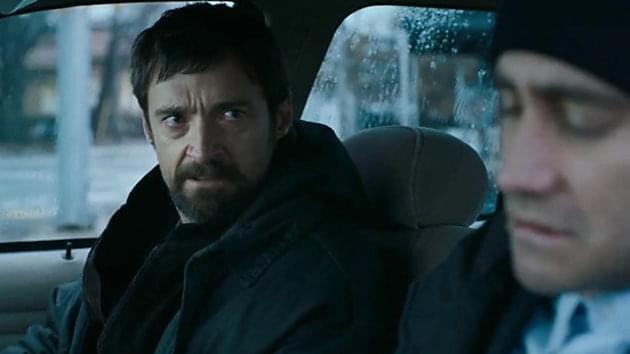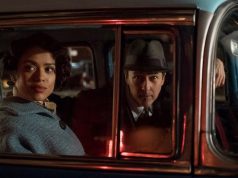
Keller Dover, who has the second goofiest name in “Prisoners,” is a devout family man who recites the Lord’s Prayer before shooting a deer in the woods near his Pennsylvania home on Thanksgiving morning. We are reminded more than once that he wears a crucifix, and his car radio is tuned to the sermon channel. His basement is well-stocked in case of an emergency, but he’s not a crackpot survivalist or armageddon-countdown enthusiast. He just likes to be prepared, cautious, and in control.
“Prisoners,” a somber and occasionally grueling thriller directed by Denis Villeneuve (“Incendies”), is about what happens when a man like Keller (Hugh Jackman) has his sense of security threatened. While the Dovers are celebrating Thanksgiving with their down-the-street neighbors, the two families’ young daughters go missing, leading to a frantic search of their small, semi-rural community. The police nab a suspect, a soft-voiced, creepy-faced loner named Alex Jones (Paul Dano), but there isn’t enough evidence to hold him. Unable to cope with a situation beyond his control, and enraged by the prospect of sitting around while the police look for his daughter, Keller takes matters into his own hands. If Alex Jones won’t tell the cops where the girls are, maybe he can be persuaded to tell Keller Dover.
Meanwhile, the person with the goofiest name in the film, Detective Loki (Jake Gyllenhaal), handles the traditional police-work aspect of the case. We’re given refreshingly little backstory on Loki — it tends to be unnecessary, doesn’t it? — but his unusual tattoos, twitchy eyes, and vigorous work ethic suggest intensity and intelligence. As if solving the case weren’t enough work, he also has to keep an eye on Keller to make sure the angry father’s thirst for justice doesn’t make things worse. (Spoiler alert: it does.)
As the ordeal continues, Keller’s wife (Maria Bello) exits the nightmare — and relieves herself of responsibility — by self-medicating. The other couple, played by Terrence Howard and Viola Davis, are wary of Keller’s tactics but complicit in them: they want their daughter back, too. Aaron Guzikowski’s screenplay grimly covers its procedural bases with effective red herrings and hidden-in-plain-sight clues — Alex’s mousy aunt (Melissa Leo), a corpse in a basement, a different creepy guy (David Dastmalchian), some snakes, a priest (Len Cariou), and a book of mazes are involved, just to name a few — and does a good job keeping us guessing about Alex’s knowledge of the crime.
Viewed merely as a gruesome, standard-issue “Mystic River”-ish mystery, “Prisoners” works well enough, though its twists and layers aren’t sufficient to justify its two-and-a-half-hour runtime. (At most, this is a two-part episode of “Law & Order: SVU.”) There are some provocative ideas rattling around here, too, but they’re more implied than addressed, even though there’s plenty of time to address them.
The obvious one, about losing the moral high ground when we torture wrongdoers, has popped up frequently in movies in the last 10 years, but seldom on a personal level the way it is here. We can say we oppose the torture of suspected terrorists on principle — but would we be as adamant if we thought the terrorist had abducted our child? In our quest for righteousness, do we (as individuals or as a society) sometimes misdirect our wrath? Religion plays a role in some characters’ lives, but not in a way that’s thematically meaningful.
Jackman’s performance as the tormented and driven Keller Dover is admirable if only for the way it keeps us sympathetic to him long after he deserves it — a testament to the actor’s inherent likability. Gyllenhaal puts a new spin on a familiar type of detective character, while the rest of the workmanlike cast do what they can with under-written roles. Part of me likes the film’s solid, old-fashioned style, the way it resembles the smart adult thrillers of the ’70s and assumes the audience is savvy enough to follow the details. But part of me wishes the film made its points more succinctly, without so much dawdling in the murky corners.
B- (2 hrs., 33 min.; )
Reprinted from Geek Nation.





